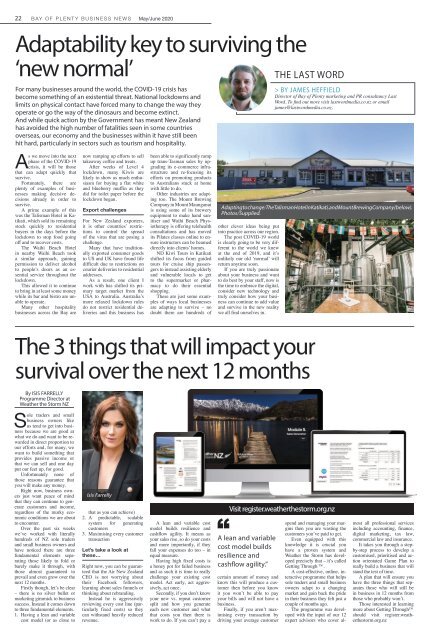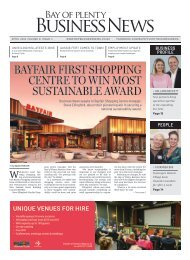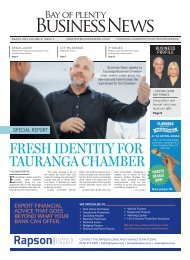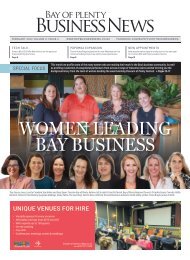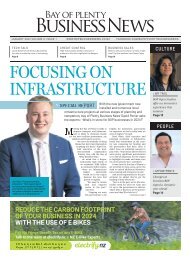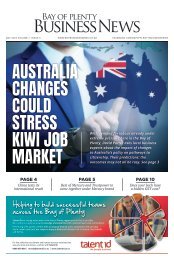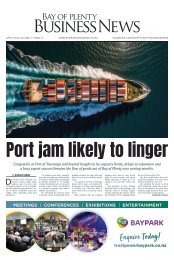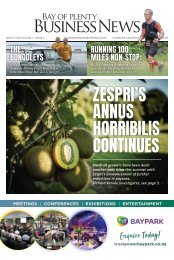May/June 2020 - BAY OF PLENTY BUSINESS NEWS
From mid -2016 Bay of Plenty businesses have a new voice, Bay of Plenty Business News. This new publication reflects the region’s growth and importance as part of the wider central North Island economy.
From mid -2016 Bay of Plenty businesses have a new voice, Bay of Plenty Business News. This new publication reflects the region’s growth and importance as part of the wider central North Island economy.
You also want an ePaper? Increase the reach of your titles
YUMPU automatically turns print PDFs into web optimized ePapers that Google loves.
22 <strong>BAY</strong> <strong>OF</strong> <strong>PLENTY</strong> <strong>BUSINESS</strong> <strong>NEWS</strong> <strong>May</strong>/<strong>June</strong> <strong>2020</strong><br />
Adaptability key to surviving the<br />
‘new normal’<br />
THE LAST WORD<br />
For many businesses around the world, the COVID-19 crisis has<br />
become something of an existential threat. National lockdowns and<br />
limits on physical contact have forced many to change the way they<br />
operate or go the way of the dinosaurs and become extinct.<br />
And while quick action by the Government has meant New Zealand<br />
has avoided the high number of fatalities seen in some countries<br />
overseas, our economy and the businesses within it have still been<br />
hit hard, particularly in sectors such as tourism and hospitality.<br />
> BY JAMES HEFFIELD<br />
Director of Bay of Plenty marketing and PR consultancy Last<br />
Word. To find out more visit lastwordmedia.co.nz or email<br />
james@lastwordmedia.co.nz.<br />
As we move into the next<br />
phase of the COVID-19<br />
crisis, it will be those<br />
that can adapt quickly that<br />
survive.<br />
Fortunately, there are<br />
plenty of examples of businesses<br />
making decisive decisions<br />
already in order to<br />
survive.<br />
A prime example of this<br />
was the Talisman Hotel in Katikati,<br />
which sold its remaining<br />
stock quickly to residential<br />
buyers in the days before the<br />
lockdown to stop food going<br />
off and to recover costs.<br />
The Waihi Beach Hotel<br />
in nearby Waihi Beach took<br />
a similar approach, gaining<br />
permission to deliver alcohol<br />
to people’s doors as an essential<br />
service throughout the<br />
lockdown.<br />
This allowed it to continue<br />
to bring in at least some money<br />
while its bar and bistro are unable<br />
to operate.<br />
Many other hospitality<br />
businesses across the Bay are<br />
now ramping up efforts to sell<br />
takeaway coffee and treats.<br />
After weeks of Level 4<br />
lockdown, many Kiwis are<br />
likely to show as much enthusiasm<br />
for buying a flat white<br />
and blueberry muffin as they<br />
did for toilet paper before the<br />
lockdown began.<br />
Export challenges<br />
For New Zealand exporters,<br />
it is other countries’ restrictions<br />
to control the spread<br />
of the virus that are posing a<br />
challenge.<br />
Many that have traditionally<br />
exported consumer goods<br />
to US and UK have found life<br />
difficult due to restrictions on<br />
courier deliveries to residential<br />
addresses.<br />
As a result, one client I<br />
work with has shifted its primary<br />
target market from the<br />
USA to Australia. Australia’s<br />
more relaxed lockdown rules<br />
do not restrict residential deliveries<br />
and this business has<br />
been able to significantly ramp<br />
up trans-Tasman sales by upgrading<br />
its e-commerce infrastructure<br />
and re-focusing its<br />
efforts on promoting products<br />
to Australians stuck at home<br />
with little to do.<br />
Other industries are adapting<br />
too. The Mount Brewing<br />
Company in Mount Maunganui<br />
is using some of its brewery<br />
equipment to make hand sanitiser<br />
and Waihi Beach Physiotherapy<br />
is offering telehealth<br />
consultations and has moved<br />
its Pilates classes online to ensure<br />
instructors can be beamed<br />
directly into clients’ homes.<br />
ND Kiwi Tours in Katikati<br />
shifted its focus from guided<br />
tours for cruise ship passengers<br />
to instead assisting elderly<br />
and vulnerable locals to get<br />
to the supermarket or pharmacy<br />
to do their essential<br />
shopping.<br />
These are just some examples<br />
of ways local businesses<br />
are adapting to survive – no<br />
doubt there are hundreds of<br />
Adapting to change: The Talisman Hotel in Katikati, and Mount Brewing Company (below).<br />
Photos/Supplied.<br />
other clever ideas being put<br />
into practice across our region.<br />
The post COVID-19 world<br />
is clearly going to be very different<br />
to the world we knew<br />
at the end of 2019, and it’s<br />
unlikely our old ‘normal’ will<br />
return anytime soon.<br />
If you are truly passionate<br />
about your business and want<br />
to do best by your staff, now is<br />
the time to embrace the digital,<br />
consider new technology and<br />
truly consider how your business<br />
can continue to add value<br />
and survive in the new reality<br />
we all find ourselves in.<br />
The 3 things that will impact your<br />
survival over the next 12 months<br />
By ISIS FARRELLY<br />
Programme Director at<br />
Weather the Storm NZ<br />
Sole traders and small<br />
business owners like<br />
us tend to get into business<br />
because we are good at<br />
what we do and want to be rewarded<br />
in direct proportion to<br />
our efforts and, for many, we<br />
want to build something that<br />
provides passive income or<br />
that we can sell and one day<br />
put our feet up, for good.<br />
Unfortunately none of<br />
those reasons guarantee that<br />
you will make any money.<br />
Right now, business owners<br />
just want peace of mind<br />
that they can continue to generate<br />
customers and income,<br />
regardless of the murky economic<br />
conditions we are about<br />
to encounter.<br />
Over the past six weeks<br />
we’ve worked with literally<br />
hundreds of NZ sole traders<br />
and small business owners and<br />
have noticed there are three<br />
fundamental elements separating<br />
those likely to fold or<br />
barely make it through, with<br />
those almost guaranteed to<br />
prevail and even grow over the<br />
next 12 months.<br />
Firstly though, let’s be clear<br />
– there is no silver bullet or<br />
marketing gimmick to business<br />
success. Instead it comes down<br />
to three fundamental elements.<br />
1. Having a lean and variable<br />
cost model (or as close to<br />
Isis Farrelly<br />
that as you can achieve)<br />
2. A predictable, scalable<br />
system for generating<br />
customers<br />
3. Maximising every customer<br />
transaction<br />
Let’s take a look at<br />
these…<br />
Right now, you can be guaranteed<br />
that the Air New Zealand<br />
CEO is not worrying about<br />
their Facebook followers,<br />
learning about sales funnels or<br />
thinking about rebranding.<br />
Instead he is aggressively<br />
reviewing every cost line (particularly<br />
fixed costs) so they<br />
can withstand heavily reduced<br />
revenue.<br />
A lean and variable cost<br />
model builds resilience and<br />
cashflow agility. It means as<br />
your sales rise, so do your costs<br />
and more importantly, if they<br />
fall your expenses do too – in<br />
equal measure.<br />
Having high fixed costs is<br />
a honey pot for failed business<br />
and as such it is time to really<br />
challenge your existing cost<br />
model. Act early, act aggressively,<br />
act once.<br />
Secondly, if you don’t know<br />
your new vs. repeat customer<br />
split and how you generate<br />
each new customer and what<br />
that costs you then there is<br />
work to do. If you can’t pay a<br />
Visit register.weatherthestorm.org.nz<br />
A lean and variable<br />
cost model builds<br />
resilience and<br />
cashflow agility.”<br />
certain amount of money and<br />
know this will produce a customer<br />
then before you know<br />
it you won’t be able to pay<br />
your bills and will not have a<br />
business.<br />
Finally, if you aren’t maximising<br />
every transaction by<br />
driving your average customer<br />
spend and managing your margins<br />
then you are wasting the<br />
customers you’ve paid to get.<br />
Even equipped with this<br />
knowledge it is crucial you<br />
have a proven system and<br />
Weather the Storm has developed<br />
precisely that – it’s called<br />
Getting Through ️.<br />
A cost-effective, online, interactive<br />
programme that helps<br />
sole traders and small business<br />
owners adapt to a changing<br />
market and gain back the pride<br />
in their business they felt just a<br />
couple of months ago.<br />
The programme was developed<br />
with the input of our 12<br />
expert advisors who cover almost<br />
all professional services<br />
including accounting, finance,<br />
digital marketing, tax law,<br />
commercial law and insurance.<br />
It takes you through a stepby-step<br />
process to develop a<br />
customised, prioritised and action<br />
orientated Game Plan to<br />
really build a business that will<br />
stand the test of time.<br />
A plan that will ensure you<br />
have the three things that separates<br />
those who will still be<br />
in business in 12 months from<br />
those who probably won’t.<br />
Those interested in learning<br />
more about Getting Through️<br />
should visit register.weatherthestorm.org.nz


